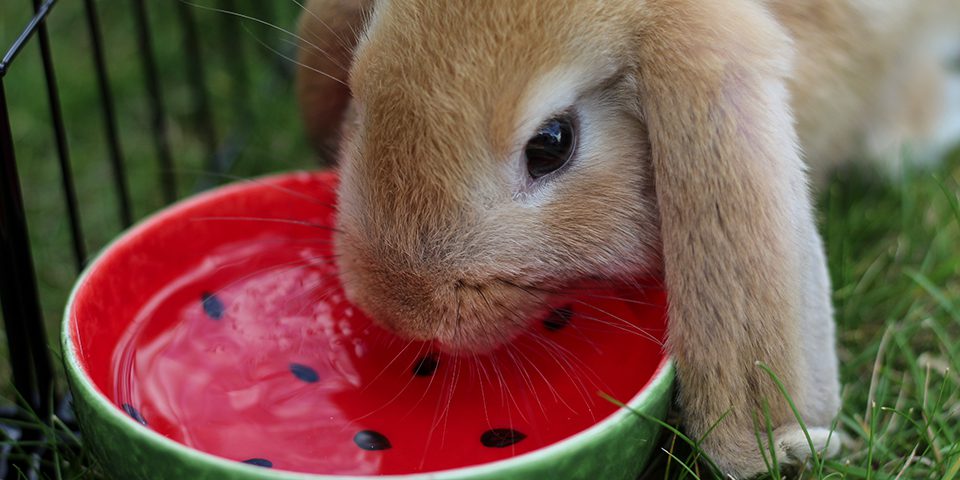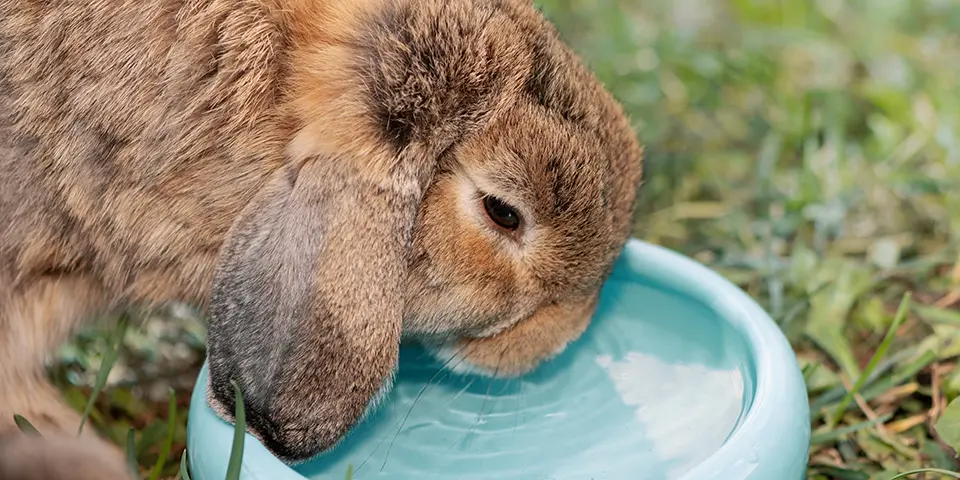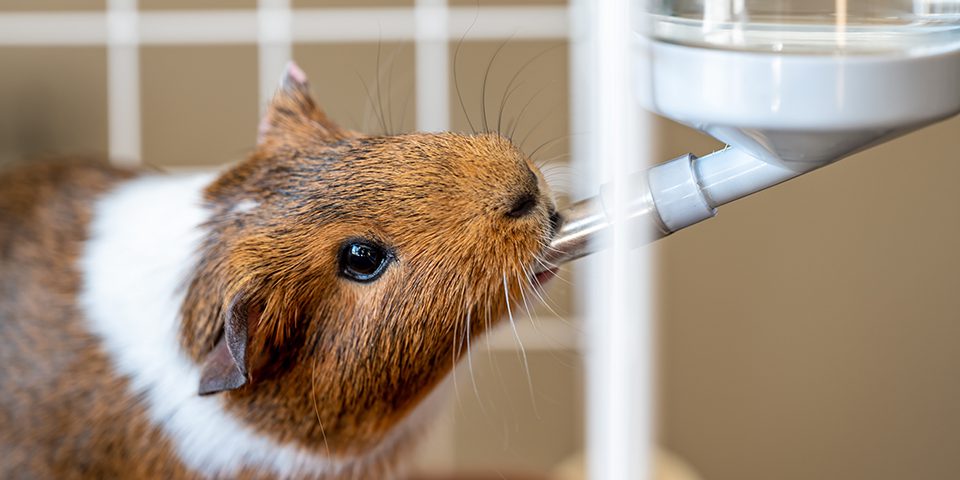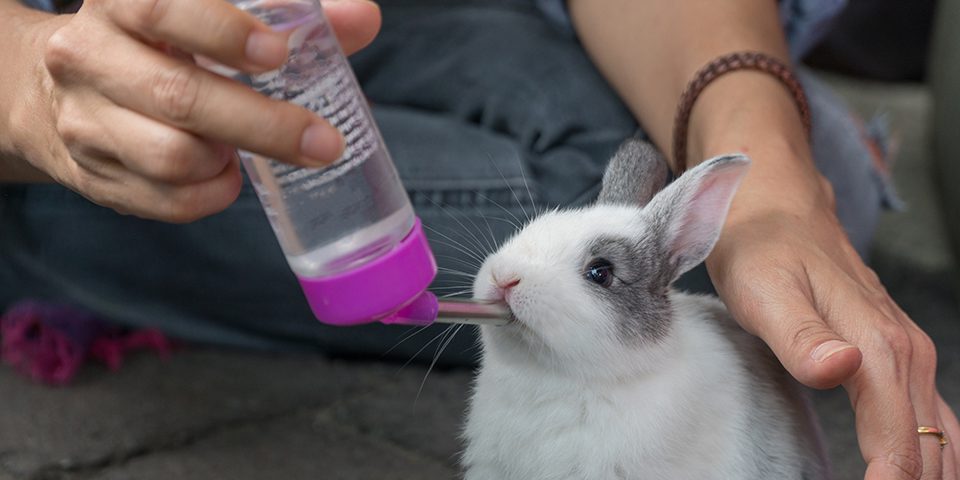Author: Cayla Iske, PhD, and Kellie Hayden
Updated: July 1, 2024
“Provide multiple water sources at all times.” “Make sure your pet is getting enough water.” “Increase water intake.” As a pet parent, you’ll hear drinking water recommendations from all kinds of sources. You’ll get them everywhere from rabbit care and guinea pig care guides to directions on your bag of pet food.
But is drinking water really that important to small pet health? The answer is an emphatic yes. Water plays a critical role in the biology of any animal. As a pet parent, it’s your responsibility to ensure that your furry friend has enough fresh, clean water available at all times to keep them in tip-top shape.
Wondering whether your rabbit actually likes drinking water? Unsure how much water your guinea pig needs daily? We’ve got you covered! In this blog post, we’ll cover common questions about drinking water for rabbits, guinea pigs, and other small pets, including:
- Why Do Pets Need Water?
- What Role Does Water Play in Small Pet Health?
- Why is Water Important for Rabbits and Guinea Pigs?
- How Can I Make Sure My Pet Drinks Enough Water?
- Do Small Pets Like Water?
- How Much Water Do Rabbits, Guinea Pigs, and Other Small Pets Need?
- How Should I Clean My Pet’s Water Bottle or Bowl?
- What Types of Water Can Small Pets Drink?
- Are Water Bowls or Water Bottles Better for Rabbits and Guinea Pigs?
Why Do Pets Need Water?
What Does Water Do for Pet Health?
One animal body is made up of trillions of cells! In order to function properly and efficiently, every single cell needs water.
Water makes up about 60% of an animal’s body weight, humans included. More specifically, mammalian cells are composed of nearly 70% water. Cells are the foundation of all tissues in the body and are essential for performing functions to keep a body operating. These operations include nutrient absorption, immune function, and a multitude of other processes.
The importance of water goes far beyond cellular activity. It helps joints stay lubricated, and it helps tissues in the mouth and nose stay moist to improve taste and smell. Water also facilitates the elimination of waste products from the body, reducing strain on the liver and kidneys.
Additionally, water is key in body temperature regulation. Adequate water intake provides moisture which can be evaporated to cool the body. Evaporation can occur through the skin for animals that have the ability to sweat (perspiration), or via airflow through the lungs and mouth during panting. Hydration is especially important when conditions are warm, as the consumption of water helps keep pets cool in the summer.
Proper skin and haircoat formation and maintenance requires water as well. The skin is the largest organ in the body and serves as the first line of defense against the outside world. If not properly hydrated, skin can lose its structure and barrier function, reducing its role in immunity and leaving the body more vulnerable to pathogens and toxins in the environment.
The notion that water doesn’t contain any nutrients is also a common and unsafe misconception. Water itself contains essential nutrients and minerals just as important for life as the protein, fat, carbohydrates, vitamins, and minerals found in food.

The Importance of Water to Rabbits and Guinea Pigs
All of the reasons we listed above show that water is important for all exotic companion mammal species, but water is especially vital to rabbits and guinea pigs because of their unique physiology.
Rabbits and guinea pigs are prone to bladder sludge and bladder stones (Cystic Calculi). Excess calcium is excreted via the kidneys in these two species. Filtering urine is a normal function of the kidneys, but excessive calcium or low levels of hydration put additional stress on the kidneys. By increasing water intake, urine is diluted and eases stress on the kidneys by helping them flush out. When more fluid is pushed through the bladder, calcium sediment is also minimized, reducing the risk of bladder stone formation. This makes hydration one of the most important steps in preventing bladder sludge and bladder stones.
In addition to supporting kidney function, water supports vital functions in the digestive system of rabbits and guinea pigs.
When these species consume pellets, hay, or other food items that are often relatively low in moisture content, they need water to ensure proper digestion and motility through the GI tract. If direct water consumption is inadequate, the GI tract pulls fluids from internal tissues or blood to properly hydrate these food items, increasing the animal’s risk of dehydration.
Proper water intake also helps maintain the continuous movement of the digestive system. A very serious health condition called GI stasis occurs when food stops moving through a small mammal’s GI tract. Because the GI tract relies on water to keep itself lubricated and moving, poor hydration puts rabbits, guinea pigs and other small pets at risk of GI stasis. With proper hydration, the risk of developing this potentially life-threatening condition is lower.
How to Help Your Small Pet Get Enough Water
The body is constantly using and losing water. To stay hydrated, animals need to drink water throughout the day. Because of this, fresh drinking water should always be available to your pet.
Additionally, make sure to have multiple sources of water available for your pet. We recommend offering one water bottle and one crock or shallow water dish. This way, your pet can choose their preferred water source. If the dish becomes soiled, or the marble in the water bottle’s nozzle becomes stuck, they still have an alternative water source available.
Drinking water can be supplemented with dietary water. Fresh greens and veggies are typically about 90% water and can help with water intake. Leaving vegetables wet after washing them also adds more water to their diet. Remember, however, that while greens and veggies can help with water intake, dietary water is not a replacement for drinking water.
As a rabbit or guinea pig pet parent, you should monitor your pet’s water intake. Keeping an eye on your pet’s water intake can alert you to a new health problem or changes in your pet’s health. For example, if your rabbit or guinea pig is not drinking enough water each day, this could indicate health issues. Dental disease may present as difficulties with drinking from a water bottle, or arthritis may present as difficulties walking over to water sources. Increases in water intake on the other hand could be related to stress, kidney problems, diabetes, or other health concerns. If you notice changes in water intake, you should consult your veterinarian to assess your pet. Make sure to explain the changes in your pet’s water intake, as well as when you first saw this change occur.
Use Caution when Choosing Food and Water Dishes
Make sure that the containers you use for any pet’s food or water are specifically designed to contain or serve food or water. Verifying the food safety of a dish includes checking the printed information on the bottom of the dish or reading information on the packaging. While they may look pretty, we recommend against thrifted dishes. Safety standards have changed in recent decades, and many dishes that you may find at the thrift shop are not food-safe. For example, many kinds of paint used for decoration on older dishes may contain lead or other harmful compounds that could lead to serious health issues if ingested.

Drinking Water Q&As
Do Small Pets Like Water?
While it may come as a surprise, some pet parents find their rabbit, guinea pig, or other small pet like to drink water. Some small pets may enjoy taking sips of water while eating their fortified food, supplements, or treats. Placing food items near a water source can encourage hydration.
How Much Water Does a Small Pet Need Daily?
Typical water intake for exotic companion mammals generally falls around 50-150 mililiters per kilogram of body weight (National Research Council, 1995). This can serve as a good general guideline for your pet.
How Much Water Do Rabbits Need?
The average domestic rabbit weighing 2.5 kg (5.51 lbs) needs 125 to 375 ml (4.2 to 12.7 fl oz) of water a day.
How Much Water Do Guinea Pigs Need?
A 1kg (2.2 lb) guinea pig would need between 50 and 150 ml (1.7 to 5.1 fl oz) fluid ounces of water every day.
How Much Water Do Chinchillas Need?
A chinchilla weighing .6 kg (1.3 lbs) needs 30 to 90 ml (1 to 3 fl oz) of water every day.
How Much Water do Rats Need?
A domestic rat weighing 0.45 kg (1 lb) needs between 22.5 and 67.5 ml (0.76 to 2.3 fl oz) of water a day.
How Much Water do Mice Need?
A 70.9 g (2.5 oz) mouse needs between 3.5 and 10.5 ml (0.12 and 0.36 fl oz) of water daily.
How Much Water Do Hamsters and Gerbils Need?
A hamster or gerbil weighing 85 g (3 oz) needs between 4.5 and 13.5 ml (0.15 and 0.46 fl oz) of water every day.
How Much Water Do Ferrets Need?
A 1.2 kg (2.6 lb) ferret needs between 60 and 180 ml (2 to 6 fl oz) of water daily.
How Should I Clean my Pet’s Water Sources?
Regardless of whether your pet’s water sources are plastic, metal, or glass, disinfecting your pet’s water sources is an essential part of taking care of your pet. After cleaning the item, allow it to fully dry and inspect it closely for retained moisture or signs of mold before reintroducing it to your pet.
Glass bottles
Use a bottle brush to gently scrub away buildup inside your pet’s water bottle and rinse the bottle out with clean water. Glass bottles and metal parts can be boiled on low to help disinfect them.
Plastic bottles
We highly recommend scrubbing the water bottle on the inside with a bottle brush beforehand. Rinse the product with a 50:50 solution of distilled white vinegar and warm water, or use a similar non-toxic, pet-friendly cleaning solution like dish soap. Make sure that all bottle parts are thoroughly rinsed before you refill the bottle with drinking water and place it back in your pet’s enclosure.
Drinking Nozzles for Water Bottles
For cleaning the nozzle, we do not suggest putting an object into the spout. We also don’t recommend letting the water faucet run through it, as the pressure from the running water may dislodge the sealing ring. We suggest soaking nozzles in soapy water and using a scooping motion to gently move water through the nozzle. Once it is clean, thoroughly rinse the nozzle with clean water using the same motion to remove soap residue from inside the spout.
Water Crocks or Dishes
Some dishes, depending on their care directions, may be able to be washed in the dishwasher. We recommend scrubbing the dish with a brush or sponge to remove backwash or harmful bacteria before disinfecting.

What Types of Water Can Small Pets Drink?
Pet parents may have some questions about types of water their small pet can safely drink. We have covered some types of water below.
- Alkaline Water. We do not recommend offering your pet alkaline water unless it is specifically recommended by an exotics veterinarian.
- Softened Water. We do not recommend offering your pet softened water unless it is specifically recommended by your exotics veterinarian.
- Distilled Water. Distilled water does not contain many of the minerals that tap water does. Drinking distilled water long term may put your small pet at risk of nutritional deficiencies, so we do not recommend offering it to your pet unless it’s an emergency.
- Mineral Water. While mineral water can be a safe source of drinking water in the short-term, we do not recommend offering it as drinking water in the long term unless tap water is unavailable in your region.
- Tap Water. Tap water is usually the best drinking option available to your pet, as long as your local municipal water supplies have deemed tap water safe to drink. Filtering this water may increase its palatability to both you and your small pets. If your house or local water system may have lead piping, we highly recommend purchasing a water filter specifically designed to filter out lead and other heavy metals.
- Well Water. Well water should only be offered to pets if regular testing is done to ensure that dangerous microorganisms like E. coli, or harmful compounds like fertilizer runoff, are not present in the water supply. If your well water tests positive for microorganisms or harmful compounds, it is not safe for either you or your pets to drink. We highly recommend discussing the benefits and risks of well water with your exotics veterinarian.

Is a Water Bottle or Bowl Better for Rabbits?
Rabbits can drink from both water bowls and water bottles. However, bowls are more natural for rabbits to drink from since they would lap up water in the wild from water sources like ponds or streams. Research has shown that rabbits drink more water from open sources of water compared to water from bottles (Tschudin et al., 2011). We recommend providing two sources of drinking water (one bowl or crock and one water bottle) to rabbits.

Are Water Bowls or Water Bottles Better for Guinea Pigs?
While individual guinea pigs may prefer one type of water source over another, it is important to provide two different sources of drinking water to guinea pigs. One source can be a water bottle, while the other is a small water supply in the form of a bowl or crock.
If you have more questions about keeping your little one healthy and hydrated, please feel free to reach out to our customer care team for assistance!
Need more information about nutrition and enrichment for your small pet? Get more tips on how to care for small mammals in our species care guides.
References
Harcourt-Brown, F. 2011. Importance of water intake in rabbits. Veterinary Record. 185; 189-190.
National Research Council. 1995. Nutrient Requirements of Laboratory Animals. Fourth Revised Edition. Washington, DC: The National Academies Press.
Tschudin, A., Clauss, M., Doron, D. & Hatt, J-M. 2011. Preference of rabbits for drinking from open dishes versus nipple drinkers. Veterinary Record. 168; 190.
